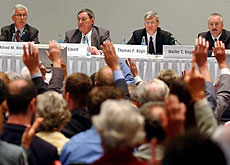Unions call for more holidays for workers

Employees in Switzerland should be given an extra week's holiday to cope with the increased stresses and strains of the workplace, unions have said.
Trade union body Travail.Suisse announced on Thursday that it therefore wanted to launch a people’s initiative for a statutory six weeks off for every worker.
Employers have described the demands as “unnecessary and exaggerated”.
Working life is not a sprint but a marathon, said Travail.Suisse in a statement. Demands on workers are higher than ever.
This situation has increased the risk of burnout, which is also costly for the economy, it added.
Travail.Suisse said that more holidays would mean that people could leave the pressure of work behind and relax more. They would also help people combine family life and career.
Booming economy
The organisation added the economy was booming and productivity had increased (15 per cent in 15 years), which meant that employees had earned the right to more paid leave.
The initiative, which needs 100,000 signatures in 18 months before it can come to a nationwide vote, is supported by a number of unions from industry and the public services. Signature collection should begin in early 2008.
Swiss workers are by law entitled to four weeks’ paid holidays, but in reality most have around five.
This is the same as the European Union average, but behind neighbours France (31 days), Germany (29 days) and Italy (26 days).
The Swiss total still outstrips Britain with 22 days and the United States with 12.
However, the Swiss come top of the league when it comes to how much they work and how much they are paid. On average, the Swiss work 41.6 hours per week and their salaries are 40 per cent more than the EU average.
Employers react
Reacting to Travail.Suisse’s announcement on Thursday, the director of the Swiss Employers’ Association, Thomas Daum, said that six weeks holidays were “unnecessary and exaggerated”.
Daum said that many employees already received more days off than the legal norm and that extending this would be costly for industry.
He added that Swiss workers had far more holidays than their British, US and Asian counterparts.
Switzerland had among the highest annual working hours, said Daum, which was the price to pay for its high standard of living. The country’s wealth was based on hard work and not on its natural resources, he said.
Quality not quantity
For his part, Theo Wehner, professor of work psychology at Federal Institute of Technology in Zurich, told swissinfo that holidays were an important means of relaxation.
“But whether six weeks is necessary is another question. If you look at the empirical evidence it is not as not all countries have six weeks, and it is more common in countries with strongly organised unions,” he said.
Wehner said that it would be better to focus the discussion on the quality of work breaks rather than the quantity – to have work-life integration rather than trying to achieve a work-life balance.
“The Swiss have the practice of morning and afternoon breaks, but how many people actually do this? They get a takeaway coffee and keep working and this is no form of integration,” he said.
He noted much could be learned from other countries, such as Spain, where breaks such as siestas and longer lunches were the norm.
People were so job-focused that some actually become depressed during the holidays when they had time to think about their lives, the professor explained.
Others took a long time to switch off from work, or were unable to enjoy the end of the holidays because of the mountain of work that awaited them, he added.
swissinfo with agencies
Paid leave totals worldwide (days):
France: 31
Germany: 29
Italy: 26
EU average: 25
Switzerland: 25 (20 by law)
Finland: 23
Britain: 22
Japan: 18
US : 12

In compliance with the JTI standards
More: SWI swissinfo.ch certified by the Journalism Trust Initiative











You can find an overview of ongoing debates with our journalists here . Please join us!
If you want to start a conversation about a topic raised in this article or want to report factual errors, email us at english@swissinfo.ch.